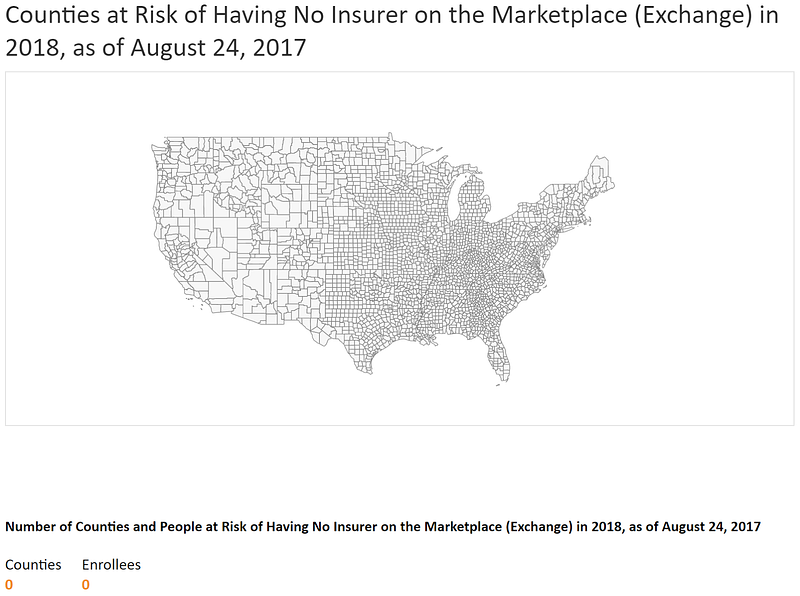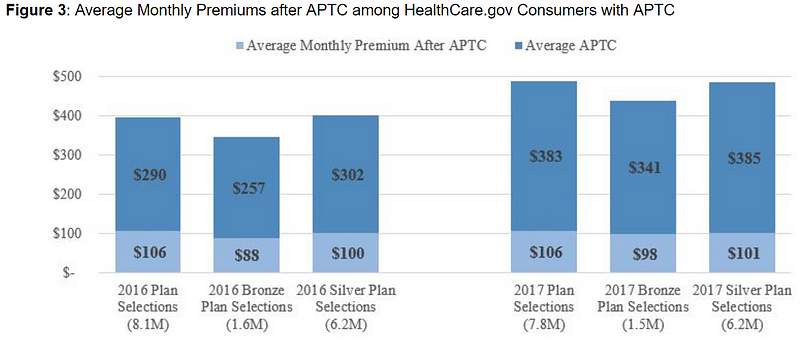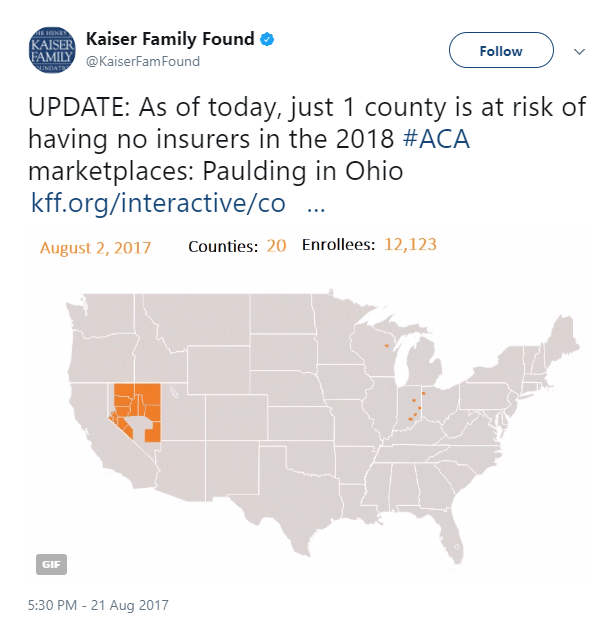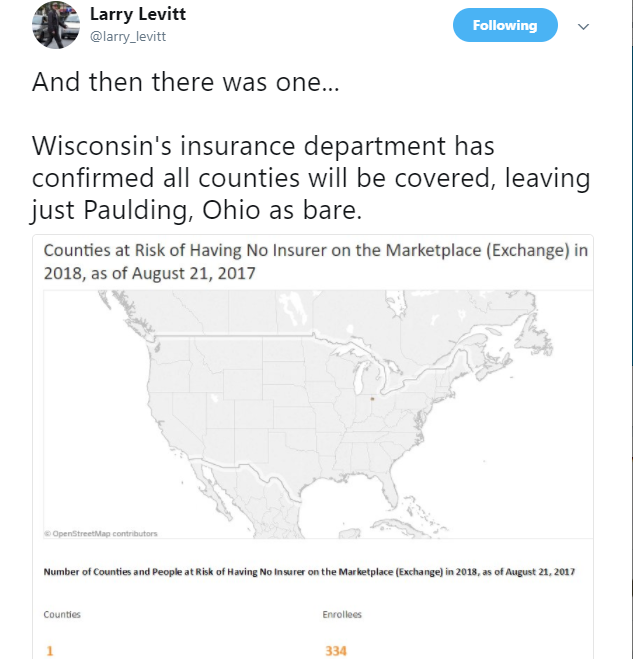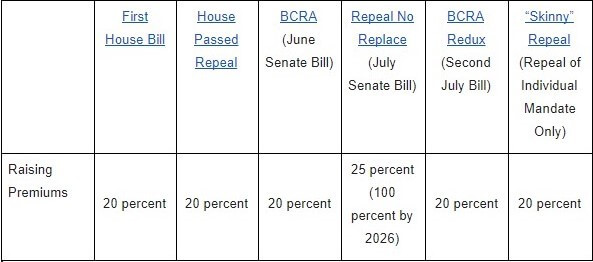Yesterday, a senior Trump Administration official — a mom with two kids — went off the record to discuss the Trump Administration’s commitment to sabotaging the health care system. While claiming to favor stabilizing the insurance markets, the official offered no substance, instead promoting more blatantly false information in what appears to be an attempt to preempt their sabotage. Just how outlandish were the statements made? Take a look for yourself…
STATEMENT: “The administration, the official suggested, will do the minimum necessary to comply with the law, which Mr. Trump has called ‘an absolute disaster’ and threatened to let collapse. ‘I don’t think we can force people to sign up for the program,’ the official said.” [NYT, 8/30/17]
FACT: OBAMACARE IS MORE POPULAR THAN EVER, AND EVEN TRUMP SUPPORTERS WANT THE ADMINISTRATION TO MAKE THE LAW WORK
Kaiser Family Foundation Poll Results: “Only Weeks After Republicans In Congress Failed To Repeal The Landmark Health Reform Law, 52 Percent Of Respondents Hold A Favorable View Of The Affordable Care Act.” “Underscoring the adage that you don’t know what you’ve got until it’s (almost) gone, the popularity of Obamacare is surging. Only weeks after Republicans in Congress failed to repeal the landmark health reform law, 52 percent of respondents hold a favorable view of the Affordable Care Act (ACA), according to a recent Kaiser Family Foundation August poll. That’s up 10 percentage points since June of last year and nearly 20 points since November 2013, when public support for the ACA was at its nadir.” [CBS, 8/30/17]
Kaiser Family Foundation: “Large Majority Of The Public, Including Half Of Republicans And Trump Supporters, Say The Administration Should Try To Make The Affordable Care Act Work.” “After the Senate’s failure to pass legislation to repeal and replace the Affordable Care Act, the latest Kaiser Health Tracking Poll finds that eight in 10 Americans (78%) say President Trump and his administration should do what they can to make the current health care law work. This includes large majorities of Democrats (95%) and independents (80%), as well as about half of Republicans (52%) and President Trump’s supporters (51%).” [KFF, 8/11/17]
STATEMENT: “‘We want people to have access to quality health care,’ the official said. ‘I look at it from a patient perspective. I’m a mom. I’ve got two kids. I’ve got a family. I try to look at health care through that lens. What would I want? What would my family want? I think people want stability in the marketplace.’ ‘We want the health care market, the individual marketplace to function and to function well,’ the official added. ‘It is not functioning, the way it is today.’” [NYT, 8/30/17]
FACT: THE HEALTH CARE SYSTEM IS POISED TO THRIVE AS LONG AS THE SIGNIFICANT UNCERTAINTY INTRODUCED BY THE TRUMP ADMINISTRATION AND REPUBLICANS IN CONGRESS IS REMOVED.
In 2017, Every County Will Have An Insurer Participating In The Health Insurance Marketplace. [Kaiser Family Foundation, 8/18/17]
Standard & Poor: “Every Time Something New (And Potentially Disruptive) Is Thrown Into The Works, It Impedes The Individual Market’s Path To Stability.” The U.S. ACA individual market shows signs of improvement, as most insurers’ 2016 results were better than 2015 results. But the market is still developing and will need a couple more years to reach target profitability. 2016 results and the market enrollment so far in 2017 show that the ACA individual market is not in a ‘death spiral.’ However, every time something new (and potentially disruptive) is thrown into the works, it impedes the individual market’s path to stability.” [S&P, 4/7/17]
Kaiser Family Foundation: “Policy Uncertainty Has The Potential To Destabilize The Individual Market Generally.” “While the market on average is stabilizing, there remain some areas of the country that are more fragile. In addition, policy uncertainty has the potential to destabilize the individual market generally. Mixed signals from the Administration and Congress as to whether cost sharing subsidy payments will continue or whether the individual mandate will be enforced have led to some insurers to leave the market or request larger premium increases than they would otherwise.” [KFF, 8/10/17]
STATEMENT: “‘What we’re seeing with some of the programs is you’re spending a lot of money on it, but the idea of these programs is to sign people up,’ the official said. ‘And if you’re giving them a grant and they’re only signing up a few people, then we’re actually wasting money there when we’re spending thousands of dollars to sign up one person. That doesn’t make any sense.’” [NYT, 8/30/17]
FACT: NEARLY 8 IN 10 AMERICANS WANT THE TRUMP ADMINISTRATION TO MAKE THE ACA WORK AND THE ROLE OF NAVIGATORS IS INTEGRAL TO THAT
Kaiser Family Foundation: “Large Majority Of The Public, Including Half Of Republicans And Trump Supporters, Say The Administration Should Try To Make The Affordable Care Act Work.” “After the Senate’s failure to pass legislation to repeal and replace the Affordable Care Act, the latest Kaiser Health Tracking Poll finds that eight in 10 Americans (78%) say President Trump and his administration should do what they can to make the current health care law work. This includes large majorities of Democrats (95%) and independents (80%), as well as about half of Republicans (52%) and President Trump’s supporters (51%).” [KFF, 8/11/17]
Bipartisan Group Of Eight Governors: “The Federal Government Should Continue To Fund Outreach And Enrollment Efforts That Encourage Americans To Sign Up For Insurance.” “First and foremost, encouraging younger, healthier people to enroll in insurance and educating Americans about the importance of coverage can help improve the risk pool. The federal government should continue to fund outreach and enrollment efforts that encourage Americans to sign up for insurance. Many states invest in similar efforts, and all states need the federal government’s support to maximize participation from younger, healthier people.” [Letter, 8/31/17]
Brendan Riley, North Carolina Justice Center: “It Seems Pretty Clear The Administration Is Trying To Undermine Enrollment In Order To Destabilize The Individual Market And Score Political Points.” “This is a sort of death by a thousand cuts,” said Brendan Riley, a health policy analyst with the North Carolina Justice Center, an antipoverty group. “It seems pretty clear the administration is trying to undermine enrollment in order to destabilize the individual market and score political points.” [Wall Street Journal, 8/9/17]
Jessie Menkens, Alaska Primary Care Association: “Menkens And Others Say They Believe The Navigator Groups Are More Important Than In Years Past, Given The Lack Of Commitment From The Trump Administration To Promoting Healthcare.gov.” Menkens and others say they believe the navigator groups are more important than in years past, given the lack of commitment from the Trump administration to promoting Healthcare.gov. “There is a lot of noise coming from Washington, and it is our job to try to cut through that and provide factual and relatable information,” Menkens said. [Washington Post, 8/8/17]
STATEMENT: “When asked if the administration would continue paying the subsidies to insurance companies to aid low-income people, the official said that ‘you still had double-digit rate increases’ when the Obama administration provided the subsidies, known as cost-sharing reduction payments.” [NYT, 8/30/17]
FACT: PREMIUMS WENT UP $1 FROM 2016–2017 AFTER TAX CREDITS AND INSURANCE COMPANIES ARE JACKING UP RATES TO COMPENSATE FOR THE UNCERTAINTY THE TRUMP ADMINISTRATION HAS CREATED AROUND CSR PAYMENTS
CBO: 20–25 Percent Premium Increase, Nearly $200 Billion Cost to Taxpayers, Coverage Losses, Market Uncertainty If Trump’s Cancels Health Care Payments. “Premiums for a popular type of individual health care plan would rise sharply, and more people would be left with no insurance options if President Donald Trump makes good on his threat to stop “Obamacare” payments to insurers, the Congressional Budget Office says. The nonpartisan number crunchers also estimated that cutting off payments that now reduce copays and deductibles for people of modest incomes would add $194 billion to federal deficits over a decade. That head-scratching outcome is because a different Affordable Care Act subsidy would automatically increase as premiums jump, more than wiping out any savings.” [Associated Press, 8/16/17]
Larry Levitt, Kaiser Family Foundation: “Ending The Payments To Insurers Would Introduce More Chaos Into An Unsettled Market, And Perversely End Up Costing The Federal Government More In The End.” “‘Ending the payments to insurers would introduce more chaos into an unsettled market, and perversely end up costing the federal government more in the end,’ said Larry Levitt of the Kaiser Family Foundation, a nonpartisan group that found similar results.” [Associated Press, 8/16/17]
Brad Wilson, CEO, Blue Cross Blue Shield Of North Carolina: “The Failure Of The Administration And The House To Bring Certainty And Clarity By Funding CSRs Has Caused Our Company To File A 22.9 Percent Premium Increase, Rather Than One That Is Materially Lower.” “The failure of the administration and the House to bring certainty and clarity by funding CSRs has caused our company to file a 22.9 percent premium increase, rather than one that is materially lower. That will impact hundreds of thousands of North Carolinians.” [Washington Post, 5/26/17]
Credit: Blue Cross Blue Shield of North Carolina
Kelly Paulk, Vice President, Product Strategy And Individual Markets, Blue Cross Blue Shield Of Tennessee: “We Have To Factor In Two Significant Uncertainties…Combining Those Two Factors Leads To An Average 21 Percent Rate Increase.” “Our 2017 rates are allowing us to earn a margin (profit) for the first time in four years and would have enabled us to propose only a small increase for 2018 to cover expected changes in medical and operating costs. However, we have to factor in two significant uncertainties — whether the federal government will fund cost-sharing reductions for low-income members and how the risk pool will change if the coverage mandate is not enforced … Combining those two factors leads to an average 21 percent rate increase.” [Blog Post, 6/30/17]
Dr. Mario Molina, Former CEO, Molina Healthcare: “Don’t Let [The Administration And Republicans In Congress] Fool You.” “The administration and Republicans in Congress want you to believe that insurers raising premiums for their plans or exiting the marketplaces all together are consequences of the design of the Affordable Care Act instead of the direct results of their own actions to sabotage the law. Don’t let them fool you.” [U.S. News & World Report, 5/30/17]
CMS: Premiums For The Benchmark Plan Increased By Only $1 After Tax Credits Between 2016–2017. [CMS, 3/17/17]
STATEMENT: “An administration official refused to offer a target for 2018 signups Wednesday, saying too many factors could affect how to set that target, chief among them high prices for Obamacare next year. ‘It is hard to say that we can get to this target or that target because there are so many things going on in the market,’ said the official, speaking on background.” [Washington Examiner, 8/30/17]
FACT: HHS HAS RELEASED ENROLLMENT PROJECTIONS AND PREDICTIONS FOR EACH OPEN ENROLLMENT PERIOD SINCE THE FIRST
The Secretary of HHS Released Projections — On The Record And The Methodology Behind It — For The 2015, 2016, And 2017 Open Enrollment Periods Ahead Of Open Enrollment. [HHS, 11/10/14, 10/15/15, 10/19/16]

